#either that or the witch narrative is finally getting me
Explore tagged Tumblr posts
Text
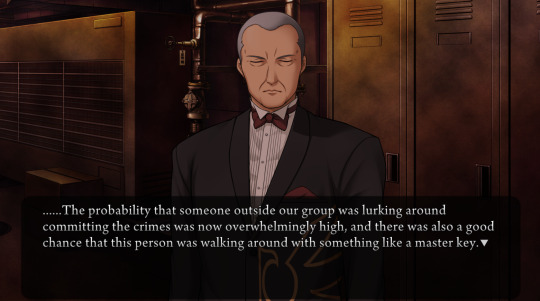
gonna be honest i hadn't even really thought about a master key until now. that's...hm.
#umineko liveblog#so almost definitely there is Someone Else about now#either that or the witch narrative is finally getting me#but assuming there's an outside party you need to think about who could realistically have a master key#which would be a servant. but the servants are already accounted for#gohda and shannon died at the start#kanon just got killed now#and genji and kumasawa are with the group#also realistically i don't think there's a person 19#which means that this is still one of the 18#and for that to be true it would mean one of the earlier corpses isn't actually dead#which is an option that's now on the table given that the ritual has been thrown out the window#but as to which person it could be (if anyone)....i don't think i could say#i guess there's also beatrice but whatever she's doing is more metaphysical probably#yeah i think the master key thing is compelling but idk how much traction it really has#might revisit the possibility when it comes to the writeup
26 notes
·
View notes
Text
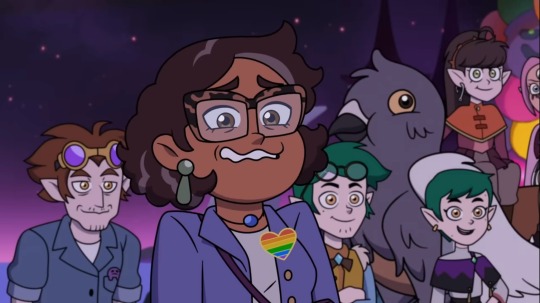
I find it interesting that even in the epilogue, four years after Camila has had time to be more acquainted with the Boiling Isles under non-threatening circumstances, she’s still creeped out by it. And this is fine! The narrative isn’t condemning her for it. It’s not demanding that she enjoy these things like Luz does; It’s just asking for her to respect its existence, and to support Luz’s interest in it and love her too.
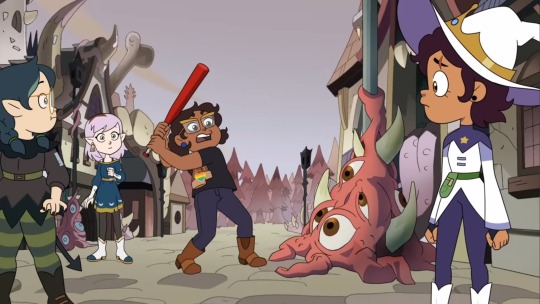
In For the Future, we see Camila horrified by what she encounters in the Boiling Isles; But she also spends the whole episode pushing through it anyway for Luz’s sake, being there for her as much as she can. Because she knows these are just feelings and nothing more, and she’s choosing to be kind in spite of them.
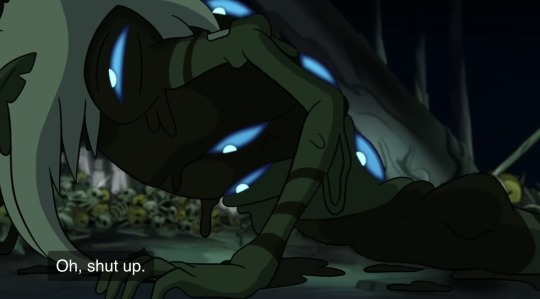
By contrast, in this same episode we find out Belos does feel empathy and guilt towards his brother and nephew, he wasn’t purely 100% only interested in what they could do for him; And yet, he’s still just as cruel and violent towards them. He’s still cruel and violent towards witches and demons, sometimes using the ‘tragedy’ of Caleb as a justification. Hell, he even resents the ghosts for making him feel guilty, telling them to “Shut up.”
Isn’t that fascinating? Disgust is portrayed as a morally neutral thing. It’s not an indictator of morality, it doesn’t mean something is bad… But it doesn’t mean the person who feels it is bad, either, people don’t consider that enough. It’s just a gut reaction. Sometimes people have internalized biases they need to work through, but other times, it’s pretty harmless as long as they’re self-aware and don’t do anything bad over it; This even applies to the process of unlearning the aforementioned biases.
Likewise, empathy and guilt don’t actually, necessarily make you a good person. The example with Belos shows how some people will actually be crueler because of empathy, because they resent people for being upset, and thus making them feel upset because they naturally empathize. Hence those who get angry at people in pain and need for “ruining their vibe,” because now they feel bad too.
There’s a juxtaposition in how Camila seems genuinely more scared and creeped out by the isles on a visceral level than Belos, and yet Camila has the common sense to still respect and fight for its existence; Whereas Belos chooses to make a mountain out of a molehill because it’s not just hatred, it’s pride. It all boils down to his ego at the end of the day. In many ways, other characters struggle with dilemmas more difficult than Belos’, yet still do better than he ever has.
This all plays into my thesis that TOH is arguing your feelings are secondary to your actions, and that the latter is what decides whether you’re a “good” person or not. In the end, someone who’s had a good life and was a dick for selfish reasons, only to choose to be better, is more sympathetic and morally superior than someone who suffered a million unfair grievances, and proceeded to dole out a million unfair grievances, with no sign of stopping; Especially from an IRL perspective, and I think our IRL feelings sometimes influence how we engage with media, and vice-versa.
That’s why the finale –and the show as a whole– emphasizes choices, over inherent, instinctual feelings. A decent chunk of Camila’s arc could be summarized by the word Squick; In the sense that it’s meant to describe things that one feels personal disgust and discomfort towards, but otherwise has no moral condemnation or problem with; It’s just a Me thing, is the point of Squick. Camila is like that sex-repulsed ace who nevertheless supports kink at Pride.
That gets me to how my ruminations were prompted by a similar observation; How some people lump sex-repulsed aces in with the oppressive Puritans who hate sex in anything, but that’s not true at all. Obviously there’s the rare Exception, but as a whole, sex-repulsed aces are on the side of other queers who ARE sexual and are demanding to let these things be normalized; It’s not for them, but they have no moral condemnation and will fight for it in solidarity anyway, especially since both are hated by the system regardless. Sound familiar?
168 notes
·
View notes
Text
[Translation] Anan 12/2024 Issue: Mahoyaku Interview with Tsushimi Bunta and Kazuma Kowo
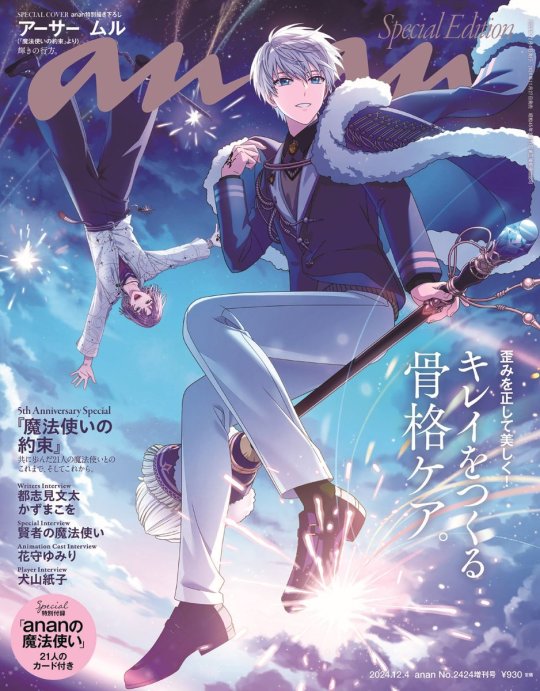
This is the short Interview with Tsushimi Bunta (Main Screenwriter) and Kazuma Kowo (Worldbuilding Supervision), released to celebrate the 5th Anniversary.
Interviewer: Congratulations on the 5th anniversary of "Mahoyaku". As you continued writing, have your messages you wanted to convey through Mahoyaku changed?
Tsushimi & Kazuma: The fundamental message hasn't changed, but we feel that the way it's conveyed to people around the world has. For example, from a youthful, hopeful message of listening to everyone's voices, like Arthur, and a world that is tolerant and positive towards others, it's shifted towards a more fatigued Figaro-like feeling where there's an overload of such messages that people are tired of being considerate and tolerant. We're feeling a sense of "For Myself" like Mithra or Owen. The message Mahoyaku sends doesn't change, but we need to change the way we address Arthur compared to Figaro or Mithra.
Interviewer: As the story progressed, were there any wizards whose character changed or exceeded your expectations? Also, Arthur and Murr have graced the cover of the special edition. Are there any wizards who would be interested in a magazine like "Anan"?
Tsushimi & Kazuma: We have never talked about this, but if we continued to portray scary characters like Oz, Mithra, Owen, and Bradley as scary, it might disrupt the balance with other characters or invite hate, so we needed to reveal their cute sides early on. If there was only one main character, we could have revealed it slowly, but to depict the cohabitation of two main characters, we needed to reveal each character's gap early on, and I think the gap was established faster compared to the normal narrative speed. I think Chloe would probably like "Anan"!
Interviewer: In Mahoyaku, there are many attractive sub-characters besides the wizards and the player. Are there any sub-characters that left an impression on you or are your favorites?
Tsushimi: Personally, I like Olivia, also Eva-sama and Sophie from the main story part 2. I'm looking forward to the day when the Mahoyaku illustration team draws them. Also, Colin's cuteness and quietness in the Etude of Frog made me feel sad but not empty. I think he swayed my preferences a bit. Also, I was happy that Dianne, who appeared as a mysterious and problematic castle lord in the 4th anniversary event, was eventually accepted with empathy and a watchful eye.
Kazuma: Who impressed me, huh...I am undecided on the names until the very end, so I will choose all the five witches in part 1.5, who are memorable. My favorites are the previous Sage, Aureolin and Scarlett from part 1.5, Zara-sama and Gill who appeared from part 2, and Eva-sama.
Interviewer: Arthur and Murr appeared in this illustration. What kind of relationship do they have?
Tsushimi & Kazuma: They are the faces of the story. Both have curiosity, a spirit of adventure, and intelligence, and they are positive about things they want to know, interesting things, and journeys, as well as having an overarching view of the masses and unwavering devotion and loyalty to those they live with. Seeing those commonalities, I think they might eventually become a pair who get along very well and might cause a lot of trouble. I think they have respect and care for each other, but also keep a moderate distance between themselves.
Interviewer: Finally, what would you like to say to the wizards and the Sage who have been working hard to walk through the story filled with various events?
Tsushimi: Sage, wizards, and all the other characters are always working hard, either to solve problems or to protect their own identities, and I'm very grateful for that. Thank you! It's still too early to say “thank you for your hard work”, so I hope you can continue to support everyone!
Kazuma: To Sage - Even coming to an unfamiliar world, I respect your positivity in taking a positive view of your environment and life, and your compassion and communication skills that allow you to step into the wizards’ minds. To wizards - You're really cool when you're battling, so I hope you'll continue to train your mind and body and wait for your turn to shine. I hope you will continue to do your best even though there may be difficult times.
38 notes
·
View notes
Text

Okay if we are going to develop the Circe/Odysseus dynamic in Hades 2, they have to go all in. Give me all the drama and murder haha. So Cassiphone is the daughter of Circe and Odysseus, whose name literally means "brother killer". There's a lot of nonsense in her myth, she marries her half-brother Telemachus at one point, but I think they can just ignore that part and keep the murder. Sorry Tele I do this cause I love u!

Random extended thoughts below cut (also trigger warning for some discussions of dubious consent):
Okay I think a lot of Hades fans are hoping that Odysseus is lying about how happily he was with Circe, which I won't pretend I'm not one of them. While I do enjoy a reimagining where Circe and similar characters escape the kind of gross tropes of woman being either the dutiful wife or the vile seductress, I do think Circe being shitty works within the larger themes of the game. How the gods trivialize and are just generally the worst to mortals (and u know, Circe is a god, she's the daughter of a titan).
So while it does pain me a bit for female characters everywhere, for the grander narrative, Odysseus being coersed into having sex with her is interesting. And that producing a child after he left the island is just ripe for drama. While also a bit cartoonish, Circe naming her kid "brother killer" as a sort of curse, dooming poor Cassiphone to her fate is witchy and on theme.
I imagine Cassi showing up in Ithaca after Odysseus dies, so Telemachus is king. And well it doesn't go well as I drew above. I haven't entirely decided what happens after that, but I do know she's wreaked by grief and regret. And while she always had a complicated relationship with her mother, it goes absolutely sour after this, realizing her whole life was to be a weapon.
I go back and forth whether she dies or not, but either way, when Chronos rises, she sides with him against her mom and the gods. And who else sides with Chronos: Penelope and, more importantly, Telemachus. Incredibly awkward family reunions ensue.
But in more serious, I like the idea of Telemachus being incredibly emotionally mature about the whole thing, understanding how Cassi didn't really have any choice in the matter, and trying to reach out and bond with his sister. But Cassi is guilt ridden and constantly avoids him.
I don't think they'd do this, but I think it would be really cool if Cassiphone and Telemachus were the final surface area's mini bosses (like Asterius). And through Meli interacting with them, it allows them to finally get over the awkward murder between them and bond as siblings. And maybe after u fix their relationship, they fight u together as a boss fight, so Meli accidentally made things harder on herself pfft. (And fun angst potential for Mel as she's missing her older brother).
But yeah, other bonus thoughts about my version of Cassiphone:
She's a vegetarian because of the trauma of her mom turning sailors into pigs.
She has pig ears for the same reason, and because it's cute haha.
I didn't really do enough to show this on her design, but I like her having owl feathers, kind of replacing her mom's pelts. I imagine she has a very weird relationship with Athena. So it can both be a sign of respect for her or insult (you don't need to kill an owl to have its feathers, but that's one way of getting a bunch of them).
There's also a lot of interesting ideas to explore with her and Penelope. Penelope being forced to look at an embodiment of her husband's 'betrayal'. But she could also be the one who tells Penelope actually what happened, finally revealing why her husband was so weird about it all and paving the way for reconciliation.
But yes, I've talked about this before, but Hades 2 lacks witch related antagonists for Melinoe. Give me more witches!
#hades 2#hades game#hades odysseus#hades circe#cassiphone#telemachus#hades#theres just so much fasinating drama with a character like her haha#also i mention mini boss for her#but i could see final boss too#if youve see my other rambly posts i just think the final boss should be human#and Cassi is too much god#(ody is part god if only a little and Circe is full so thats more than half god)#but still possible#my art#hades oc#hades 2 oc
40 notes
·
View notes
Text
Ichi the Witch ch.17 thoughts
[Lemme Get That Neck]
(Topics: character analysis - World Hater, speculation - narrative progression)
Hoo boy, this was a good chapter for both of our guys!
I was really worried about how Ichi was going to deal with the backlash of using Ultra Amplification since he hasn't had an opportunity for resistance training, but to think he'd find a way to use it to his advantage!
Playing Possum
By making of a show of passing out from exhaustion, Ichi deliberately gave World Hater an opening to get in close, which in reality created an opening for Ichi to strike. An extremely risky move, since not only did Ichi have to fall out of the air for it, he also had to rely on a) stabbing himself in the leg to actually keep him conscious, and b) for World Hater to care enough to check on him afterwards
Fortunately, Ichi's read was spot on: even World Hater has a sense of pride, and having his Lancemen stopped in their tracks was enough of a slight on him that he had to make a point of telling Ichi his efforts were wasted. Ironically, in trying to chastise Ichi for his hubris, World Hater showed his own, believing himself to be so far above Ichi that he didn't even consider the possibility that Ichi was luring him into a trap
But being overconfident comes with the territory of being a villain with godly powers. The part that really interests me is what comes after Ichi stabs him
A Crack in the Facade
I've spent the last two reviews going over how dispassionate World Hater looks to be, his complete lack of expression or interest in what anyone says or does, but this chapter adds a whole new dimension to it!
After Ichi gets a good hit on World Hater, he passes out for real, and misses World Hater's face finally showing an expression: he smiles. Not a huge toothy grin or a sinister smirk, but his lips undeniably curl and, though subtle, his eyes flash, not unlike the sparkle we frequently see in Ichi's eyes
For the first time, there's passion on World Hater's face, intrigue even, like he's finally found something he's been looking for
But it doesn't stop there, or rather, it does stop there - the smile doesn't simply fade once the moment passes, World Hater covers it up. He brings his hand to his mouth, like he's either trying to hide his feelings from the world or like he's trying to suppress them from himself. He either doesn't want anyone to see him feeling, or he doesn't want to feel at all
The next panel focuses on the return of his scowl, his lips once again turning downward as he returns to business. Whether he's taken a liking to Ichi or sees potential in him, World Hater ignores his feelings and proceeds to dole out Ichi's punishment: by specifically warping him out first
But again, World Hater is taken by surprise! Whether he was distracted by Ichi or simply not concerned with the possibility of a sneak attack, World Hater is stabbed through the back and subsequently blown up by none other than Desscaras!
Ceiling Battle
I don't know about the rest of you, but this is the moment I've been waiting for! I've said before that Desscaras vs. Uroro was a ceiling battle because it was billed as the strongest Witch vs. the strongest Magik, but it didn't really accomplish what a ceiling battle should because we didn't actually get to see the extent of what either of them could actually do
This time though, there doesn't seem to be any restrictions like "only men can hurt me," so while there is almost certainly some hidden mechanic to this fight, both parties should be lobbying a good portion of their best moves at each other. Even if World Hater barely breaks a sweat, all that matters is that we get to see what it really means for Desscaras to be the strongest Witch and get an idea of how she earned that title
My guess is that we'll get some narration from Shirabedonna and Monegold about how many Magiks she's acquired and some discussion about one of her most impressive feats, similar to what we saw for Togeice a few chapters back, culminating in her using her strongest ability to force World Hater back in a way that even Ichi couldn't manage
We'll also likely hear about Desscaras' backstory with World Hater, though it's hard to say how much detail we'll get right now. It could be an entire chapter dedicated to the full event from her perspective, or it could just be a vague description with some inconsistencies to be elaborated on later. Either way, Desscaras is undoubtedly about to get a lot more interesting
Now that we have an established antagonist, I expect we can say the same for the plot as well
The Aftermath
Once Desscaras saves the town from World Hater (though possibly not without some casualties), the question of what to do about Ichi will remain. His actions will ultimately be what allowed Desscaras the time to break into the dome and fight World Hater, but technically World Hater's point stands - Ichi could have guaranteed saving some lives if he'd focused on doing so, but instead he focused on his own gratification and went for an attack that, by all logic, was destined to fail. He prioritized his own bloodlust over helping people, and thus put more people at risk than he needed to, so even if things turned out "for the best," his decision-making is still highly questionable
The introduction of Togeice and her concern for Ichi's personality always struck me as kind of oddly timed. Not only was Ichi's reveal being proposed after one mission, but an ice-themed Witch was being introduced immediately after Ichi acquired an ice-themed Magik. It felt kind of...redundant, in a way, to pit Ichi's most recent acquisition against someone who specialized in that very field without doing anything to draw comparison between them. I thought maybe Togeice was just mad that he beat her to Uruwashi, but no, it was never brought up
I think with this week's chapter, though, my question has been answered, and all the pieces are falling into place. The world doesn't know about Ichi, but you know who they do know about?
The Silver Snow Witch
The townsfolk didn't see Ichi squaring off against World Hater, they saw an army of giant monsters approaching them only to suddenly be encased in ice. Moreover, those same townsfolk already know that Togeice is present, and saw her summoning an ice dragon to destroy the giant mushrooms that were previously threatening their town. For all they know, Togeice is doing all the work
Ichi's acquisition of Uruwashi was merely a convenient setup for Nishi to cover up his battle with World Hater, allowing Ichi to fight his hardest without revealing himself to the world as a whole and undermining Togeice's concerns and challenge
If I'm right, then I'm pleasantly surprised how elegantly this allows Nishi to transition into the training arc phase without compromising the logical progression of the story. Ichi's nature is still a worthwhile concern while also being more nuanced than Togeice anticipated, Ichi has the opportunity to see and accept how he needs to grow, and the fight that facilitates both is executed in a way that neither point is invalidated! My assertion from early on that Ichi the Witch is a masterclass in story structure seems to once again be relevant!
Assuming I'm right, of course
Until next time, let's enjoy life!
33 notes
·
View notes
Text
2024 in Gaming
Helldivers 2: it's become a running joke with the polycule, and approval with Progressive opinions or talking points now gets at least one of the three of us to jokingly pull out their smartphone to "call their Democracy Officer to report a case of treasonous activity"...
Walt isn't any better, but he's unlocked a few rocket-propelled weapons and now feels better sitting behind myself and Sarah while pelting the enemies ahead with weaponized Freedom.
Balatro: Walt and I's new favourite casual game, wherein appearance of it being a cutesy little variant on Poker suites turns into virtual crack. I've woken up in the wee hours to Walt's face bathed in his phone's OLED screen. When I ask him what's wrong, he typically replies something to the tune of "I need four thousand Chips, babe."
Marvel Rivals: it does what Overwatch 2 don't. As in, it's fun. Me, Walt, Sarah and a few of the boys on an all-Rocket Raccon match? You betcha! Also, there's Jeff the Land Shark, and Jeff the Land Shark deserves the world. Nay, the universe.
Astro Bot: didn't finish it, but I loved what Team Asobi cooked up. It's the most genuine, heartfelt, cutesy and engaging piece of corporate PR and Engineering porn to ever exist. Every button pressed during an Astro Bot session twiddles Mark Cerny's fun bits remotely.
Elden Ring - Shadow of the Erdtree: bought it because I approve of the design ethos behind this DLC's existence, never played it because I suuck at FromSoft games. I made sure to watch some related content so I could point and laugh awkwardly if friends of mine greet me with a random cry of "BAYYYYLE!"
Worshippers of Chtulhu: Anno with a Lovecraftian twist. It's very broken, still very much in Early Access, but the promise is definitely there.
Park Beyond: Meh. Got it for cheap, I guess we're still not getting a decent heirloom to Roller Coaster Tycoon, after the Micromanagement nightmare that Planet Coaster turned out to be for me.
1000xResist: basically a Yoko Taro game not written or directed by Yoko Taro, and it's one of the deeper game-based experiences I've had in a long while. Strongly recommended.
The Cabin Factory: Spot the Difference for easily-frightened streamers who haven't played Exit 8 yet. It has an interesting narrative format and is one of the more surprising implementations of Unity Engine I've seen to date. I could've sworn this was a UE5 project! Beyond that, it's nothing special, but it's priced accordingly.
Clickolding: if Cookie Clicker had an uncanny sense of atmosphere and managed to creep you out with nothing except a sparsely-animated antagonist and a rising click counter, you'd have a sense of what this feels like. It does a very effective job at making you want to be as compliant and possible.
Daemonologie: The Salem Witch Trials in game form, or Ace Attorney if Phoenix wore a Quaker hat and had a fixation on nakey women doing odd shit in the forest. Very tense and minimalist, and very, very worthwhile.
Cryptmaster: it's basically a spruced-up oldschool MUD, with 3D black-and-white graphics and four zombified D&D character archetypes you control simultaneously, by either using your Arrow keys to move the entire party at once, or typing in the words that correspond to abilities or attacks. Very, very, very British humour is on offer, along with a script-writer that managed to predict most stupidly filthy prompts you're likely to try at any given point. It's hilarious and kludgey in just the right way, especially if you remember the nineties' MindMaze on Encarta '95.
Liar's Bar: Russian Roulette for Furries with a decent voIP chat integration. It's shallow and stupid fun, and the subject matter makes people behave in increasingly crude ways as the session goes on. If you're like me, you'll swear you played a round or two against a guy who was actually stone-dead-drunk and who actually had nothing to lose...
Silent Hill 2 Remake: finally, Silent Hill's fog doesn't feel like a performance-saving measure and actually creeps me the fuck out. It makes me feel terrible and has me contemplate not playing it, but it does make sense. Kudos to Bloober Team for finally manage to ground this one heck of a weirdo title.
Indiana Jones and the Great Circle: take Kingdom of the Crystal Skull and Dial of Destiny, burn all copies, consign the masters to Disney's oubliette, thank Harrison Ford for his decades of diligent service and pass the fedora and bullwhip to Troy Baker, 'cause Machine Games and Bethesda have managed to find themselves yet another prime title to fuck Fascists up using fisticuffs or blunt weaponry. It's a great callback to Machine Games' own contribution to Deus Ex: Mankind Divided, seeing as every single level in the game has the granular detail of their version of Prague. Slap some John Williams on, add the authentic audio samples for whip cracks and punches, lifted straight out of the movies. I haven't had as much fun raiding tombs or poking through lovingly-reconstructed real places since Nolan North last lent his voice pipes to Nathan Drake.
Imagine my surprise, when the Sistine Chapel turned out to be about the size of our condo building's parking lot! That's tiny! The more you know, I guess!
Star Wars Outlaws: this is what happens when a studio really, really, really wants to give the IP due diligence, but its decades of re-iterated design docs ruin the experience. Kay Vess isn't a galactic scoundrel; she's basically every Far Cry protagonist ever, except in third-person!
The Forever Winter: all crunch, no fun. An incredibly engaging premise, but the mistaken notion that the average gamer has several three-to-four-blocks to devote to this each and every single day. Worth at least a YouTube ride-along, to see the incredible work the Art Design team's pulled together.
Disney's Epic Mickey - Rebrushed: Warren Spector's poorly-received baby and love letter to classic animation gets its just desserts on PC. It's not super complex with only two basic mechanics based off of two buttons on a controller, but it managed to use an extremely limited toolset to great effect, even throwing in what feels like a younger relative's first potential exposure to the Immersive Sim concept of looking for unmarked routes through a level. The in-between side-scrolling levels are oozing charm, and essentially feel like some part of Spector wanted to play in the same ballpark as American McGee's Alice.
If anything, it cements the idea that non-verbal instances of Mickey Mouse should never be left in the same room as a magical implement or toolset. Ever. Verbal Mickeys can push past their childlike glee and reason accordingly, but the oldschool button-eyed and non-verbal originator is not to be trusted.
STALKER 2: Heart of Chernobyl: Have fun losing half your health because the ARMA-esque mechanics decide that grazing damage means holy shit, you almost died! Especially, have fun getting knocked flat out on your ass by mutants - over and over and over...
To be played in subtitled Ukranian out of implicit support, and to have fun with the Slavic definition of an acting range. It's like watching the second season of Squid Game, except you get the sense that their scale goes from Nonchalant to Pants-Pissingly Terrified with very little grading in-between.
And now, for Games I didn't really get into until 2024...
Valfaris and Valfaris II: Mecha Therion: side-scrollers that do their damndest to look like they stepped straight out of the pages of Heavy Metal as of the mid-eighties. Gorgeously grotesque pixel art meets with a banging soundtrack made up of certified shredders. The lead headbangs and throws the horns when he finishes a stage!
Brütal Legend: an oldie but a goodie, previously constrained to the PS3 but now quite cozy on my Steam Deck. It's got a semi-cohesive grab-bag of mechanics, sure, but it's got even more heart, along with a pre-stroke Tim Curry voicing the villain with the gooiest of all countenances. Imagine Shere Khan, but Metal as fuck.
Katamari Damacy: Re-Roll: I barely touched the original when it came out. Having managed to grab the PC port for cheap and knowing how well it plays with a Steam Deck, the Prince of All Cosmos' ball-rolling sojourn across the surface of our planet has turned into a nightly staple for me.
Baldur's Gate 3: Yes, I know, I'm late, you've all banged Astarion sixteen times by now, but I've got time for a long-form WRPG right now. I might not have this much free time once January 10th rolls around.
The Night Cage: not a vidya, but a really nerve-wracking tabletop game that's made for quite a few fun Friday nights at La Casa de Gremlin.
On My Backlog, You'll Find...
Metaphor: Re-Fantazio: I know it's beloved by all, but it feels so "so far, so ATLUS" to me, and I still haven't gotten over P4, P3 and P5's excellent PC ports. I also have Shin Megami Tensei: Nocturne to go through, so I really don't know if I have it in me to tackle something in that same vein quite so soon.
Arizona Sunshine 1 & 2: I just can't be bothered to set up my Oculus Rift 2's Link Cable. I have the games, I just don't know if and when I'll play them.
Dead Rising Deluxe Remaster: I'm waiting until my old cheese strats fade into the back of my mind before I tackle this one. Plus, I'm torn about Frank West not being voiced by TJ Rotolo. He doesn't just... feels like he's covered wars, y'know?
Frostpunk 2: bought it to support the devs, am just not jazzed about having to sort of network my way across several simultaneous points of origin until the depressing version of a Dieselpunk sprawl covers the map.
The Yakuza series on Amazon Prime: SEGA's trying to become the Disney of gaming, but something about Kazuma Kiryu's story (or stories) have always felt distinctly and uniquely Japanese to me. As in, it requires a specific mindset and might not be for everyone. I'm waiting for a sign, basically - maybe one to pop my collar and rent a karaoke machine so I can belt out maudlin soliloquies to lost childhood innocence while smoking half a pack of cigs between every third or fourth stanza...
The Sonic Movies: yeah, sure, I'm in my forties, but Jim Carrey's going through a career renaissance by acting out Albert Einstein on crack. Yeah, sure, it's not either of my Robotniks (the Jim Cummings or Long John Baldry versions - for the memes) - but it seems like it might still be a trilogy of adaptations worth pursuing.
Plus, hey, I gotta start catching up on that Stobotnik shit, huh?
#games#2024#thoughts#helldivers 2#balatro#marvel rivals#astro bot#elden ring shadow of the erdtree#worshippers of chtulhu#park beyond#1000xresist#the cabin factory#clickolding#daemonologie#cryptmaster#liar's bar#silent hill 2 remake#indiana jones and the great circle#star wars outlaws#the forever winter#disney's epic mickey rebrushed#stalker 2 heart of chernobyl#valfaris#valfaris II: Mecha Therion#Brütal Legend#Katamari Damacy: Re-Roll#Baldur's Gate 3#The Night Cage#Metaphor: Re-Fantazio#Arizona Sunshine
32 notes
·
View notes
Text
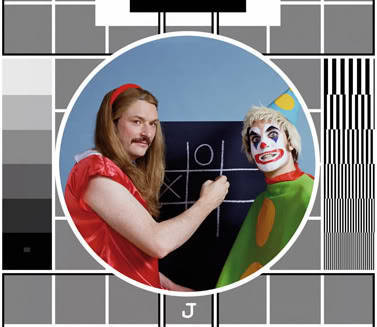
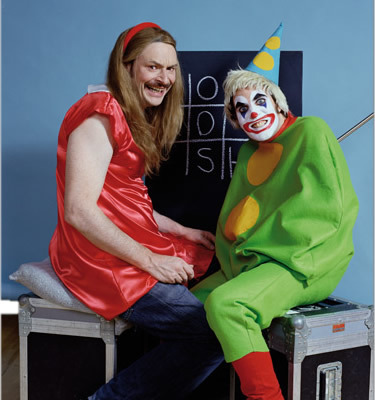
Any small child catching sight of Noel Fielding of The Mighty Boosh in his clown gear would vow never to go to the circus again. Fielding’s torso is encased in a green felt globe, his hands protruding helplessly from the bottom. From beneath lurid make-up, he flashes a deeply unsettling grin, as if auditioning for the role of a psychopathic killer in Test Card: The Movie. “I’m just popping out for some coffee,” he deadpans. “Does anybody want anything?”
His Booshmate Julian Barratt, who currently looks like the victim of back-alley gender reassignment surgery, brushes his new blond tresses away from his face and sighs. “What a job, eh?”
When the duo decided to pose as the pair from the 1970s TV test card, it didn’t take long to decide who should play which part. If you want make-up and a manic grin, Fielding’s your man. He arrives at the studio resembling a time-travelling glam-rock star: pointy boots, snug red trousers, tight T-shirt, pendant shaped like a Flying Vee guitar, alarming bone structure. In one episode of their TV series, Barratt tells Fielding, “Look at you - feather cut, the pointy features. Put you in the 1950s, you’d be imprisoned for being a witch. They’d lock you in a trunk!” He’s probably right.
Barratt carries himself like someone trying to elude capture. It’s this wary unease that defined his performance as misanthropic style journalist Dan Ashcroft in Nathan Barley, Chris Morris’s Channel 4 comedy series. Morris wanted Dan to be someone who “wasn’t really comfortable in his skin”. I ask Barratt if Dan is a version of his own personality and he looks mildly wounded. “Not really, no. There were elements of me - it’s sometimes painful to be around people who are annoying - but Dan was a bit of a tit. I didn’t really like him.”
The Mighty Boosh have already completed two successful BBC series and are currently working on a third. Fielding, 33, thinks comedy is about allowing people to feel young again. “When you’re really laughing, you feel like a little kid and nothing matters. Everyone’s trying to feel as free as they were when they were kids.” Barratt, 38, seems to regard comedy’s inner workings as an imponderable mystery. “You still don’t know why you’re funny, do you?” Fielding says. “Not really,” Barratt sighs.
After almost a decade of working together, the pair are obviously close. When the camera’s not pointed in their direction, they huddle on the studio sofa in earnest conference punctuated by giggles. There is much to discuss: “We’ve got so many things we want to do and we need a basket to put them all in,” explains Barrett. “A structural basket.”
Fielding has a different metaphor. “We know when we’ve got enough ideas. If we haven’t and we try to write, it’s a bit weird. It’s like loading a gun and not having enough bullets.”
They first met in 1996, when Fielding went to see Barratt doing stand-up in High Wycombe. There had been less auspicious nights. Barratt recalls, “I ran off stage at my first gig. Halfway through it, I forgot my lines and didn’t know what to do, so I just ran out of the building down towards a lake. I was going to throw myself in, but the compere came out and said, 'No, it’s going well, come back and finish the gig!’ ”
The two share enthusiasms (Captain Beefheart, Monty Python, Mr Benn) and Barratt launched their collaboration by asking Fielding if he wanted to write the new Goodies. “We wanted to be a gang rather than a sketch troupe,” he says. From the start, their combination of absurdist wit, far-fetched narratives and bizarre musical interludes was the stuff of cult success. Audiences either entered their world and found them the funniest thing around, or they didn’t get them at all. “We used to have to convince people we were funny,” Barratt says, “and it didn’t always work.”
It did, however, work well enough to earn them nominations or awards at three consecutive Edinburgh festivals. A radio series followed and they finally made it to the nation’s TV screens in 2004. Earlier this year, they returned to touring. They get offers all the time, but having got this far on their own idiosyncratic terms, they have no desire to work according to anyone else’s.
“If Tim Burton called up and said, 'I’m making a film about two white Americans who go and become Red Indians’, I’m sure we’d jump at the chance,” Fielding says. “But if it’s, 'Do you want to be in this sitcom that’s a bit like Coupling?’ I’d rather shoot myself.”
When did you first find something really funny?
Noel Fielding: My nan used to look after me in the summer holidays and she had a cat with one eye. It used to walk into walls and tables. I used to think it was hilarious. It was a slapstick cat.
Who are your comedy inspirations?
Julian Barrett: I loved the Goodies’ sense of adventure.
NF: The Young Ones was the first thing I really liked. I was so young I didn’t really know what students were. I just thought they were some men who lived in a house.
What’s not funny?
JB: Cancer?
NF: It can be, though, can’t it?
JB: Yeah, sometimes a tumour will make me laugh.
When did you last laugh?
NF: I laugh all the time. I’m slightly simple. I went to a festival in Cambridge last weekend and there were men standing on a wheelchair and getting their friends to push them down a muddy hill and really hurting themselves. One of them had a fur coat, a dress underneath, massive boots and a witch’s hat. It was so stupid that everyone was laughing at them. It was quite freeing, actually.
What’s the funniest thing that’s ever happened to you?
NF: Once I got stuck in a suit of armour. I had to be a knight in Al Murray’s show for two minutes. I had a gig afterwards and there was no one there backstage, so I couldn’t get out of it. I had to run next door and do the gig in a suit of armour. Al thought it was the best thing ever. “You should do that every night! It’s brilliant!” he said.
What’s the secret of comedy?
JB: The secret of comedy is don’t grow up. That’s why some comedians are a nightmare, because they never grow up.
Tell us a joke
NF: You stop hearing proper jokes when you’re a comedian. I’m always slightly disappointed by real jokes. There’s a lot of pressure to understand them and laugh at them. Occasionally we come up with a proper joke by accident and we almost apologise.
· The Mighty Boosh debut live DVD is released on November 13.
x
32 notes
·
View notes
Note
Hi!
So idk if anyone asked you this yet, but what are your theories on the mysterious riding figure in the opening scene?
Because a lot of people have made good cases for both Elphaba and Glinda, but the only reason why I lean towards Elphaba and that the horse is actually Feldspur is because Fiyero literally offers her a ride when they first meet. I don't think he's extended that to Glinda (not yet anyway).
Second, how many Wizard of Oz canon scenes will we get in Wicked: For Good? We know we have the Core 4 meeting Oz(head) and then walking away from Kiamo Ko with Elphaba's broomstick.
Keep up the great analysis as always!!! 😃
I think Elphaba.
Narratively it's a really good way to foreshadow the last twist, puts a really cute expansion on the "same scene different perspective" that is in the musical at this point with the sad reprise of "No One Mourns the Wicked" in the finale (and indeed this is what the entire musical is about compared to Wizard of Oz). I think we'll see Elphaba and Fiyero meet up somewhere in Oz (I'm quite a fan of like around the corner from where Dorothy has just used her shoes to fly home).
It's been pointed out to me (thanks @gamorahww ) that there is a tunnel out of Oz marked on Doctor Dillamond's map, just south of the Emerald City:

So I imagine they'll use that to escape.
As for Wizard of Oz canon scenes? In all honesty, I think we'll get moments just before or just after. Just judging by what we've seen of Dorothy in movie one and in the teaser I think we're going to see just the back of her. I'd like to see more to be honest, it would be very interesting to see more of her companions seeing as we know their history with Elphaba - but I wouldn't be too surprised if they want to keep the scarecrow reveal until the very end like in the musical.
Saying that, March of the Witch Hunters is going to be very interesting. They barely get away with not showing the Scarecrow on stage for that in the Musical, there's no way they're not going to either have him there or a reason for him not being there in the movie.
26 notes
·
View notes
Text

@turnkeyassurance saw your tags and figured I'd take the opportunity to pause my descent into madness to give my more sober opinions on the Ni no Kuni franchise, lol. (Warning: I am a humongous JRPG nerd)
The NNK games are really odd ducks, quality-wise. You can call either one a good game or a bad game and call either one better than the other, and any combination of those opinions can be something I think is entirely justified. Both of them have things they do remarkably well and also serious, profound, deal-breaking flaws, and the really weird thing is that there's almost no overlap between those two lists for the two games. What clicks and doesn't about both of them is going to be deeply individual.
What Ni no Kuni: Wrath of the White Witch does, with resounding success, is Vibes. It sets out at every single step with the goal of being a playable Ghibli movie, and it sticks to that principle. It's all about beautiful, cel-shaded whimsy. It's a game for people who want to feel like they're wandering through the meadows in the movie version of Howl's Moving Castle. There are lots of puns, and you can befriend all the random encounter monsters and feed them ice cream.
But that's also its Achilles' heel: because it's dedicated entirely to imitation, it has trouble bringing things to the table that are really its own. It has the visual and narrative aesthetics of Hayao Miyazaki's films, but it doesn't have the raw emotion at the heart of them. And as a game, its mechanics combine the clunkiest features of menu-based combat and action RPGs, and while everything about the Pokemon-esque mechanics seems designed to encourage players to collect and experiment with them, the balancing turns attempting to do that into a miserable grindy nightmare.
The other problem is that it... isn't actually the first Ni no Kuni game. Wrath of the White Witch is, in fact, a remake of the Nintendo DS game Ni no Kuni: Dominion of the Dark Djinn, which was never released outside Japan. The reason for this is pretty easy to explain, because DDD had another gimmick besides its aesthetics: it came with a real-life physical copy of the wizard spellbook, and the player had to look things up in it and draw sigils on the DS touchscreen to cast spells. So, we've got a high-effort remake that had to completely cut the central mechanic... and which also expanded the plot so that the original main villain was no longer the primary antagonist. This results in a game with what is very clearly a final dungeon and very clearly a final boss and very clearly a resolution to the story, which suddenly has a completely different plot dropped on it like a fucking anvil that it expects you to be just as invested in even though it hasn't had anything like the same level of buildup.
And ironically, this is almost the exact opposite of the biggest problem with Ni no Kuni 2: Revenant Kingdom, a.k.a. the one with my new blorbo, the President of the United Union of Eagleland. 2 is an effort to try to cement an identity for the series that can be its own, rather than requiring them to depend indefinitely on borrowed Miyazaki nostalgia. It just has the teeny-tiny, itsy-bitsy problem that at some point in development it had a budget shortfall so bad that you can finish the game without ever realizing that there is a continent-sized crashed interdimensional spaceship on the world map.
This game has had a machete taken to it. Don't get me wrong, I genuinely respect the work they did to make what they could with what they had, but you can see the signs of massive scope cuts to literally every aspect of the game. The back half of the game has almost exclusively recycled enemy and environment assets; voice acting has been trimmed down to canned voice clips; the catboy protagonist's ears and tail are barely animated; one minigame was so inadequately playtested that a level 16 mission is massively harder than level 50 ones; and while whatever restructuring they had to do to the main plot still left the final version with a more solid and coherent central arc than WWW in my opinion, it also left a lot of truly gaping plot holes, like oh, I don't know, why the President of the United States got turned into a 19-year-old.
Literally, they just. Entirely forgot to explain that. Half the DLC is just the writers scrambling to fix stuff like that and add a bunch of character development that should have been in the base game.
However, despite all this, I personally enjoyed NNK2 more than NNK1 unironically, not just for Rolandposting reasons. Compared to the first one, it plays much more smoothly as a straight action RPG, and while it can't provide the same knock-your-socks-off aesthetic cohesion, to me it seemed a lot more heartfelt- that is, like a game that was made because people had a story they wanted to tell.
But, well, we wouldn't be here if it wasn't for the non-unironic reasons, because the story they really, genuinely wanted to tell was about a magical catboy growing up and learning to become a leader, and somehow, miraculously, they really thought that was the story I was here for too when they opened the game with the President of the United States being isekaied by Nuke-kun.
Sorry, guys, I have a crippling addiction to dramatic irony and my day job is tech work in local politics, you could not have more laser-targeted this at making me specifically laugh my ass off if you tried.
89 notes
·
View notes
Text
Wife Goals: Morrigan

February. Intense Loneliness. Must gush about fictional women as poor substitute for an actual relationship. Gushed about Harley Quinn last time. Gush about someone else now. Must fill void in heart.
You know what's a great at temporarily filling the gaping void in your heart? RPGs! Well, RPGs with romance subplots, anyway, not all of them have those I suppose. But a lot of them do, and boy howdy do they scratch the itch for a while! ...a short while. Then it comes back. Dear god it comes back.
But the really good ones scratch that itch real good, and few have scratched it as well for me as Dragon Age Origins. DAO does a great job of hooking you in - depending on your species and class choice, you'll get a different origin story for your main player character that gives you a very personal stake in the conflict to follow. The game makes its early tutorials personalized in this regard, with them doing the dual purpose of teaching you how to use your character's unique abilities while also establishing the life your character has been living till now and how the actions of one of the many villains in the story's overarching plot will completely blow it up to Hell. It's very good, gets you invested in your character really quick, and makes you eager to build something new from the ashes of what came before.
Which you then immediately get a chance to do - you have one last tutorial mission of sorts, a small little exploration and fetch quest with three other new recruits for the organization of monster-slaying international warriors you've joined called the Grey Wardens. Your first companion is one of those fellow recruits - the other two are, well... they're surplus to requirements, narratively speaking. But that's fine, because in that fetch quest you meet the second companion you can recruit.
Specifically, you meet Morrigan, the witch of the wilds. And she is so, SO key to what makes DAOwork.
Regardless of which origin story you picked on character creation, it will show you an important fraction of the setting for the game as a whole. You'll learn about one of the hierarchies of this society - whether it's the caste system of the dwarves, the way elves are either forced to live in an increasingly shrinking wilderness or treated as second-class citizens in the cities, how mages are treated as inherently dangerous time-bombs who have to be institutionalized for the good of "normal" people, and how the human nobility are constantly scheming to take each other out for a power grab. Shit's fucked in a lot of ways, and that's BEFORE you find out about the supernatural monster apocalypse that's brewing underground.
And so it's notable when you meet Morrigan, a witch and, more importantly, a person who lives completely separated from society and all its hierarchies. You, the player, have just been introduced to these systems, and are surrounded at first by people who treat them as immutable truths, and may already be internalizing that This Is Just How It Is Here. But then, at the end of this very final tutorial level, you meet this strange, goth-as-hell witch who immediately starts looking at those systems and saying, "You realize those rules are dumb as hell, right?" Because, like you the player, she didn't grow up in this world, and she, like you the player, can see that Shit's Fucked actually.
This is not to say that Morrigan is some super-enlightened being - she is, in fact, also the product of a horrible abusive hierarchy, just one that's a lot more small and personalize. Morrigan, you find out, is the daughter of Flemeth, who's more or less the setting's equivalent of Baba Yaga, i.e. the archetypal supremely powerful wicked witch in the woods. And like the daughters of the Baba Yaga in Slavic folklore, Morrigan's relationship with her mother is... well, strained in ways that you'd expect for a woman whose mother is an infamous immortal folklore witch.
Flemmeth is a hermit and a misanthrope who views the world as being red in tooth in claw - the strong survive and the weak perish, so you have to be as strong as possible and accept that the weak are meant to die. There is no room in the strong for pity, mercy, or affection - only ruthless self-interest. This is the philosophy Flemmeth believes in, and it's one she's forced into Morrigan as well, and which Morrigan is quick to parrot at all times.
Morrigan has a... mixed reputation in the DAO fandom. A lot of people hate her because, well, she has been taught to believe in a ruthless "might makes right" philosophy, and as such frequently gets pissy when you do, you know, hero shit in your game about saving the world. It was so talked about that Bioware actually sold "Morrigan Disapproves" shirts to play on how, well, Morrigan disapproves of a lot of actions that seem like what you, the player, should OBVIOUSLY do.
And, like, I'm not going to argue that she's right in most of these circumstances. You should help the people of Redcliffe, you should save children from being possessed by demons, you should stick your neck out for people in need. I am a fan of heroes doing hero shit even and especially when it inconveniences them - I am one of those lame players whose wish fulfillment fantasy is "let me be nice and helpful to as many people as possible."
But, like... the conflict between those philosophies is what makes the relationship you develop with Morrigan so damn great. Morrigan is one of four romance options in DAO, and she's one of the quickest to propose you and her begin an affair. She explicitly stipulates that it's a physical thing only, though - stress relief, not a sign of, like, love and affection, because she doesn't believe in love and affection, those are feelings weak people have, and she's definitely not weak! She's strong, her mommy told her so!
So let's say you say yes, because she's a smoking hot goth girl and you're not going to say no to that. Sure, she's a bit ruthless and can be a buzzkill when you're doing Hero Shit, but she's still very polite to you and can be sweet in her own vampy sort of way. And, like, sometimes she makes pretty good points when criticizing the world you live in! Morrigan is one of the only characters who criticizes the inhumane treatment of mages in civilized society - your only other spellcaster companion actually thinks the cruel treatment of mages like herself is necessary, because she's fully internalized the bigotry against herself. Morrigan is cold, but she's not always wrong. There are times when she challenges the world and is correct to do so.
And, well, as you go along and develop your relationship, Morrigan starts to get... attached. She initially claims she's fine with you sleeping around, but backtracks if you actually do - claiming, of course, that she's fine, there's nothing personal, go ahead and sleep with someone else, she's sick of you too actually! (Note: I know this only from youtube clips, I never cheat on my video game wives, not even in alternate playthroughs.) When you get deeper into the relationship, she actually pulls back on affectionate gestures - as if she's scared of what she's feeling about this TOTALLY CASUAL fling you have.
You eventually get to her personal quest, which involves "killing" her immortal mother after you find out that Flemmeth kinda sorta totally plans on stealing Morrigan's body for herself once Morrigan gets strong enough (immortal witches aren't commonplace you know), essentially making Morrigan less a daughter and more, like, livestock to be used in her mother's eyes. When you actually go through with it in one of the toughest optional boss fights of the game, Morrigan's reaction is bafflement. You did all that? For her? Just to keep her around?
She cracks and admits that she only started a relationship to make you her protector - that it was self preservation, nothing more. She's so guilty about what she's done, about how you've suffered on her behalf, and most of all, on how she cares about you now because of it. She doesn't want to say what's obviously true: she loves you, and love is a weakness, and that makes her weak, not strong, and she's terrified of what it means for you and for her.
And you have to tell her the truth that she's really known for a long time but refused to admit: love is not a weakness. Love is a strength. And she tried to argue against it, but she finally concedes. She can't bear not loving you.
The relationship you form with Morrigan is one where you and her challenge each other, constantly. She disapproves, you disapprove, but you need each other, and you both have something to learn from each other. It's not a case of Morrigan becoming good so much as it is her slowly realizing that goodness was in her all along - that as much as she claimed to the contrary, she really is a loving person at heart.
I have a lot of issues with the Dragon Age sequels, but one thing I will say for them is that they allowed Morrigan to retain her growth from Origins. She remains haughty and ruthless, but she also has a kind, compassionate, and selfless streak that was always there in DAO, but had to be brought to the surface kicking and screaming.
Like, I've played a LOT of RPGs where you romance people. Because I'm a sad lonely person who needs to fill the gaping void inside me, you know. But out of all of them, there are few romances where "I love you" hits harder than when Morrigan says it, because you BOTH fought like hell for her to have the courage to say those words, and you know damn well how much she means it.
15 notes
·
View notes
Text
So I'm reading What If Wanda Maximoff and Peter Parker were siblings and I find myself disappointed- this book is probably just not for me. Shame I really wanted to like it and I recognise the landmark significance of having a writer of Roma decent finally write Wanda. It's a wonderful thing and I hope it opens more doors for the writer and for Roma and other minority creators to write minority characters. However, reading this I have mixed feelings. I've got some thoughts under the cut (spoilers).
I'll give this book a 4/10 but it's treatment of Pietro and other non American characters has left a bitter taste in my mouth. I'm a massive Pietro fan and a fan of both twins so I may be biased. I hope others can get more out of this book than me. It definitely has it's good points that I can see winning it some fans.
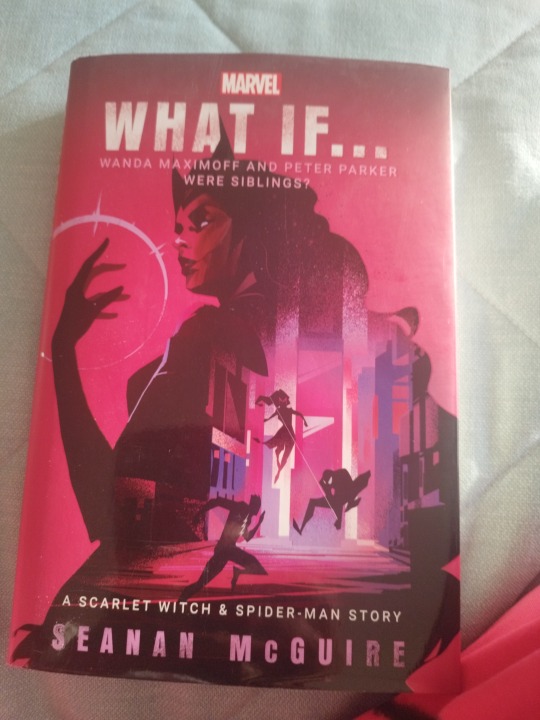
Let's just say this is a YA book that reads very YA. I can definitely see the appeal for fans, especially of Spiderman. Wanda is the main character though little of her lore gets used and her relationships are destroyed. The author does make a genuine and really nice effort to respect and call focus to Wanda's heritage and the disconnect of being an American adoptee.and there are some nice mentions of Django but it all gets undercut by the author harping on about how wonderful Aunt May is for introducing Wanda to him.
I do encourage people to pick this book up and form their own opinions. If you are a fan of the MCU and Spiderman comics you'll probably walk away happy and have mixed feelings as a comic Wanda fan (Quicksilver fans and fans of the twins relationship just save yourself the trouble and not read this book trust me!). Maybe wait till it's cheaper though as it's a lot of money to spend on something you might not like - I'm planning on returning or donating my copy because I walked away feeling cheated.
The book however is very American and Wanda is emphasised to be American. The American characters are largely good and the foreigners with foreign accents largely bad. Other Romani characters are either cameos or evil. If your a fan of Pietro and the twins relationship just don't pick this up.
Basically as long as Wanda has a brother with a similar name to Pietro she'll be fine, her bond with her twin can just be superimposed onto other characters. It negates the importance of one of the most important sibling relationships in comics and reads like Magneto's letter to the twins in Scarlet Witch and Quicksilver (except where the reader believes that Orlando meant for Magneto to be unironically right). It feels a little dirty and like it's there to serve Peter Parker and give him a win rather than Wanda. Anything meaningful that could have been said about the twins relationship is instead given to Peter.
Making Pietro a one dimensional evil twin was a very boaring and very overdone take. Writers love to make Pietro evil despite the characters history and it never has been done well (as has the evil twin trope in general) and has always been immediately walked back in the comics for a reason.
And while I definitely don't think the author intended it this way, having Wanda have zero interest (Pietro is treated terribly by his sister, the other characters and the narrative from the second he appears or is mentioned) and reject her "evil foreign" family in favour of her "wonderful white American" family has some unfortunate implications.
Wanda also rarely accomplishes anything for herself. The 616 Wanda learns magic on her own, immigrates to America with her brother, builds her own community and reclaims a racist name thrown at her. She works hard and everything she accomplished was her own. In this book everything she accomplishes is because of Peter, Ben and May - they find her a Romani community, she doesn't seem it out on her own, they take her to strange who is souly responsible for teaching her magic and tells her everything she needs to do. Wanda is super passive in this book.
No hate to the writer though. I do think their talented and they have acknowledged they know people will be unhappy with some of the takes in the book. I respect what they've created even if I don't personally like it.
https://x.com/MunchkinM17/status/1828490359682298342
#What if Wanda Maximoff and Peter Parker were siblings#wanda maximoff#pietro maximoff#maximoff twins#quicksilver#Scarlet witch#Spider Man
25 notes
·
View notes
Text
slowly points at tai. and glynda.
when glinda lays siege to the emerald city, she demands that mombi be delivered into her custody lest she take the city by force. mombi’s first trick is to cast a spell on herself and jellia jamb to switch their appearances, and jellia in the guise of mombi is handed over to glinda. the trick is soon discovered and glinda performs a counterspell, revealing jellia’s true appearance (and mombi’s as well, within the emerald city).
mombi’s second trick is to transform herself into a red rose, hiding in the palace gardens. jinjur invites glinda and her allies into the emerald city to search for mombi, under the condition that if they do not find her by nightfall, they must leave in peace. mombi is, in the end, discovered by accident: the tin woodsman plucks the rose on a whim and carries her out with him.
mombi is a bad sorceress from the northern country of gillikins, whose color is. purple. rwby’s ozian narrative doesn’t track the color-coding exactly (atlas, winkie country, is white) but it’s close enough for glynda being Conspicuously Purple to stand out—good witch of the north, and her name is both a nod to the conflation of these two characters in pop culture and a misdirection away from glinda. witch of the north. mombi.
the key players in vale right now are:
salem (glinda)
cinder (???)
summer (jinjur)
taiyang (jellia)
glynda (witch of the north)
with the twist of course being that this jinjur is working for glinda (and she might be doubling the role of woodsman for this final leg of the story, given that ironwood is dead and summer has an axe and the obvious connection to a certain red rose). and glinda isn’t looking for a witch, she’s looking for a crown. but the particulars are the same; we have a witch advancing on the fortress in pursuit of her goal and another witch standing in her way.
now. obviously
glynda isn’t an illusionist. and it remains to be seen whether this misdirection plays out narratively versus just being a more meta red herring. but. it does seem to me that the narrative choice to emphasize that we don’t know what “things” tai is “looking after” in vale while at the same time providing enough details about what glynda has been doing in vale to look like a completed picture, is priming the audience to jump to a certain conclusion (tai must be guarding the crown) that masks what’s really going on (glynda is the crown’s guardian and tai is up to summer rose related things).
i.e., the jellia <=> mombi swap.
with summer/jinjur being on salem’s side, if this red herring unfolds narratively, the obvious way to do it is for summer to believe that tai knows where the vault is hidden (and that raises the very juicy possibility that she might be, er, stringing him along in hope of cajoling the location out of him, which would be very ozmacore of her). meanwhile glynda is the one who removed it from beacon and buried it under that “ruined temple” after summer disappeared, and glynda wisely disappears herself after salem razes vale.
THEN… sooner or later salem wrings the truth out of tai that he doesn’t fucking know anything and by then glynda has reconvened with ruby rose et al in vacuo: you get glinda’s pursuit of mombi to the desert at the end of oz and the woodsman jinjur finding the red rose roles neatly into one plot point, and straight up not being able to find the vault gives team salem an incentive to try… or well, keep trying new things, because salem is already at a point where she found out the lamp wasn’t out of questions and immediately tried to pry the "password" out of oz/oscar.
like it does… all track quite well except for the rather thorny question of how cinder figures in all this. if summer isn’t doubling up on jinjur + the woodsman, then the intuitive character to step into that role is cinder—and that might be setting up either a cinder vs glynda rematch in vale (if the red rose is a plot beat) or a reckoning between cinder and ruby in vacuo (if the red rose is ruby learning, from glynda, where the vault is hidden). which is also interesting. but cinder’s also an odd fit for the woodsman across the board, whereas summer clicks neatly into the role.
it’s possible that cinder just Doesn’t Have a part in the ozian narrative, period—she’s tied very, very strongly to the maiden-in-tower narrative because that’s what the cinderella narrative is repeating, and for salem the ozian narrative is the tower. so it makes a certain narrative sense for cinder to not be in the tower, because she’s instrumental in getting salem out of it; she holds the key to the door.
(i do really seriously wonder if the choice spirit won’t be an old woman—like mombi, like the maiden’s mother-captor, and also because it would be hysterical for the contrast to jinn and ambrosius. choice as persinette’s fairy + part of mombi in particular is sort of compelling, given her inevitable connection to cinder and the probable importance of choice in liberating ozma from oscar)
but it’s also odd and leaves cinder with a lack of things to do in vale, which is another reason i think she might bounce and then return.
26 notes
·
View notes
Note
Hi Rikki. If Bonnie doesn't like vampires and Klaus doesn't like witches in canon, how do they make sense as a couple?
Long post warning: I think it's important to note that Bonnie doesn't hate vampires and never has. She hates the bloodshed and violation of humanity that comes with vampires. If anything, Bonnie does hate killers. When she meets Kai and finds out he murdered his family, she immediately has a problem with him.
Bonnie’s entire arc was not about hating vampires. Now why is this change ignored by the fandom? Well, who knows. Bonnie has never outright attacked any vampire simply for being one. Just those who were causing harm to her friends or have hurt her directly. Fans don’t try to acknowledge Bonnie and write her off as a vampire hater for 8 seasons. When Bonnie accepted vampirism from ALL her friends. She places their own emotional-needs and wellbeing before her own but that isn’t enough for fans. Bonnie’s emotions are defined as irritating and judgmental when the entire show is about humanizing vampires.
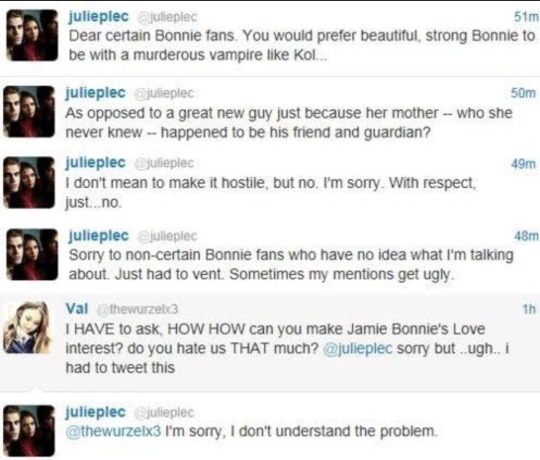
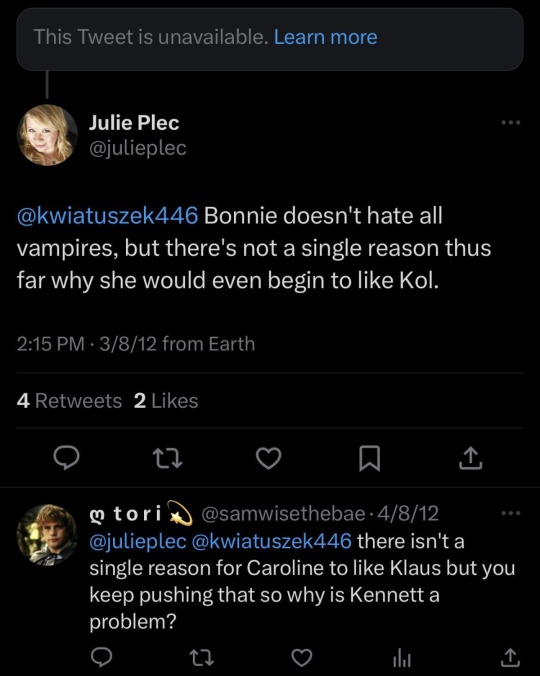

Bonnie doesn't have the luxury like Caroline and Elena to flirt with murderous vampires. Until the very end of the show in season 7 with Enzo at that time Bonnie she claims Damon is her bestfriend. That’s before Elena and Caroline. There’s issues there as well but I won’t get into that. Yet even with the hypothetical thought of Bamon there’s still this continuous negativity directed on Bonnie’s end. Julie insulted Elena just to prove a point. The Bamon Ban existed and it was real. It may have applied to Bamon but with the writer being so vocal about their dislike for Bonnie it meshed with all Bonnie ships.
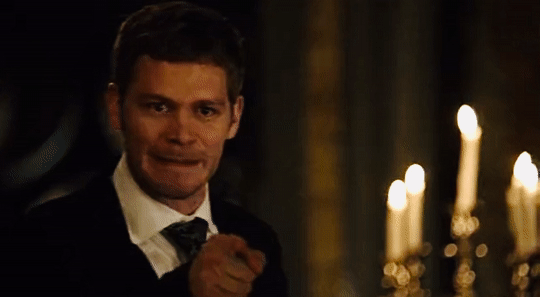
Klaus hated what his mother did to him and his siblings. He hated his mother for binding his wolf side. The blame for those actions has been to his parents only. There was a never a moment in canon where Klaus blamed anyone else but his parents for what happened to him and his siblings. Bonnie is a witch just like Esther, but why would Klaus hold her accountable for something she did not do. Bonnie wasn’t even alive when Esther did that! It’s ridiculous take to think Klaus would blame Bonnie for his trauma and would not like her because she’s a witch like his mother. Bonnie is NOT Klaus mother and has never been in a maternal position to Klaus. Notice this claim and outright refusal doesn’t exist when people discuss Stefan and Klaus friendship. Stefan wanted revenge for what Klaus had done and they’re still well liked. Caroline can celebrate Klaus death in season 3 and fuck him in season 5 they’re one of the most popular ships. No questions on either of these but it’s Bonnie that people have such a huge issue getting over when it comes to Klonnie shipping. For a ship that is so small and limited in canon there’s always a fan commenting on how “disgusting” and “illogical” the ship is.
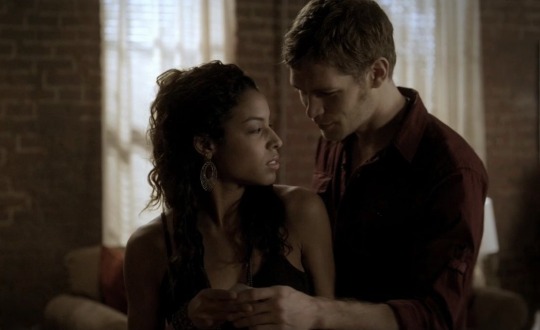
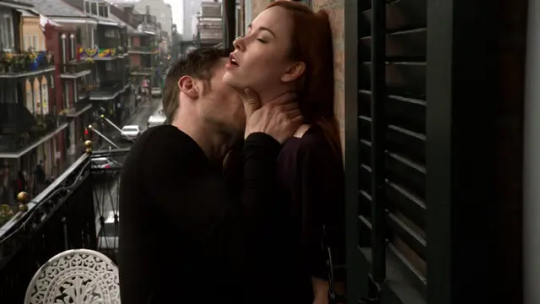
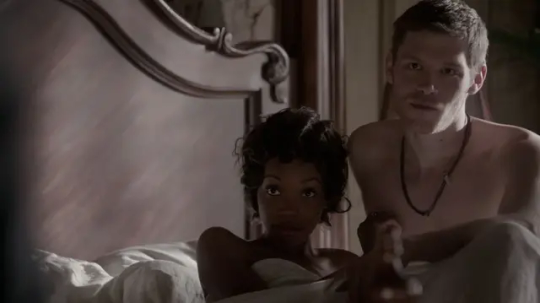
Klaus had allies in witches like Gloria, Greta, Genevieve and Maddox. He’s had sex with both Greta and Genevieve who are witches like his mother. Freya is a witch, Hope is a witch. Klaus did not wake up everyday blaming and hating these other women for the actions of his parents. So I must ask again, why would he turn to Bonnie and hate her simply for being a witch? Doesn’t make sense to me. In 2x17 Isobel and Katherine discuss Klaus and witches. Klaus was abandoned by Ansel he still slept with werewolves like Hayley or Lana.
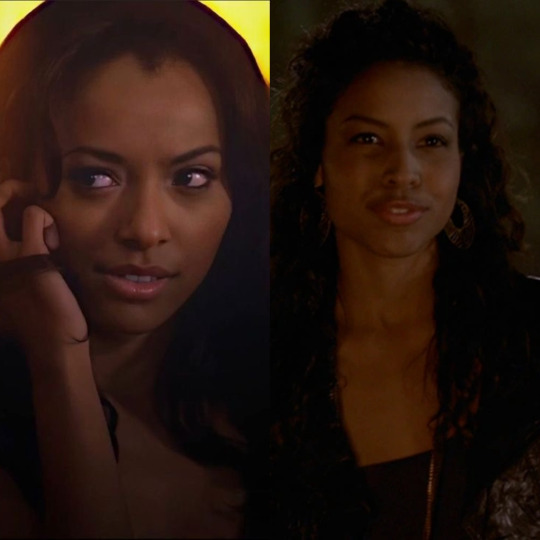
The fandom places rules and regulations on Bonnie because the writers did. I’ve given enough evidence to prove that Klaus would be willing to date anyone despite his parental trauma, as would Bonnie if she is given the affection and chance too. The problem will forever rely in the writers and the fans who continue to push these narratives. A ship so little like Klonnie shouldn’t have many fans arguing about how disgusting and gross it is. Why is shipping Bonnie with Klaus (or any non-canon character) disgusting but none of the canon white centered relationships get this type of reaction. Finally, if the series kept up with Klaus taste in witches the only woman who matches the woman Klaus was intimate with at that time would be Bonnie.
#klonnie#bonnie bennett#klaus mikaelson#bonnie x klaus#klaus x bonnie#the vampire diaries#the originals#tvd#anon ask#rikkisinbox#Tvd meta#Anti Julie Plec#Anti Caroline dries
89 notes
·
View notes
Note
I'm very scared for Saint and Osiris. I don't want anything to happen to them but the talk of "finally have our time together" and the "I love you" lines are lighting up my death flag radar and I have never wanted to be getting the wrong vibes on a character death more.
Sometimes this can be true, but I don't think it's true for Destiny. It's just not the theme of the story, especially not for these two. There's really no purpose that either of their deaths would serve besides pointless angst which is not something that fits within the narrative or the theme or the vibe of the story so far.
There's a lot of tragedy happening in Destiny, sure, but it's never pointless tragedy without something to say or without a theme. We would really gain nothing story-wise if these characters died; not after they've been given essentially a conclusion and a place in the setting where they can settle down.
I would not worry about Saint and Osiris being in danger. Obviously anything is possible in the story and anything can be made to fit the story somehow, but I genuinely do not think this is something they would seriously plan for.
Osiris' arc in particular this year has been all about him overcoming grief and working through his loss and trauma, to realising that his past behaviour would've led him down the same path Maya Sundaresh went to. This realisation shocked him to the core and made him understand that he has to let go of his obsessions and not put himself and his loved ones into the same position Maya left Chioma in. So I don't think that he would do something reckless that would put him in danger. He seems to be very firmly set on helping and doing what he can, but not going too far in a way that would hurt him and Saint.
I felt for Eris in a similar way back in Witch when people were afraid that she'd die. And while obviously anything is possible within the story, I never felt like they would ever go down this route for her. Eris' story about overcoming trauma ending with her death would've been such a bad way to frame it and the writers clearly care deeply about her character and her character arc to do that. Generally speaking, professional good writing should not (and does not) include random deaths for shock value and pointless angst. This is definitely much more common in fandom spaces, primarily because you don't really have to deal with consequences in the wider story with a fanfic. You can just write an angst one-shot and move on.
The point is, I don't think there would be any value or anything to gain from killing either one or both of these characters. I saw the radio message as a conclusion, rather than a nefarious hint for future angst. It just makes zero sense to me that they would do that, given the story so far and the whole theme. Osiris and Saint have also been through a tremendous amount of tragedy already so I think their angst quota has been fulfilled. This was a very neat way to frame their story before the end of the main saga, as well as a neat way to frame the story in general: a story about hope.
45 notes
·
View notes
Text
This originally posted here a few days ago for members, but I wanted to also release here as audio- for one, it has some beautiful quotes and poetry in there, and for another, it's more where I'm really at- disconnected, discombobulated, spun around and trying to figure out which way to go next and what of the million things I need to be moving forward on, but hopeful and feeling better despite all of that. Text of the original post to follow:
Transition Notes Part Five: Final Girl? Monster?
This got started a few months ago as two different posts in my drafts. I'm including these bits here because they're relevant to a chunk of what I'll be talking about. Shame patreon doesn't give me dates from when I start a post, just the date I last looked at the edits, which for both was a few months ago. I'm just gonna label them "Earlier" for the one post, and "quotes" for the other, since the second post was largely me shoving quotes together for a later analysis. Also a "Now" tag for the current additions. Is it a jumbled mess? Yes. But that's also very much where my brain is at this point, so it makes a kind of sense. Plus, it unintentionally flows, so I'm going with it.
Earlier: My hair touches shoulders constantly now. I've never had hair this long in my life, and despite the curl, it is constantly in contact with my shoulders or my upper back depending on how I sit, and it's amazing. I'm also in crisis and have been for a few months. Getting regularly paralyzed by executive dysfunction while being trans (and having some of the concurrent Life Events that happen when you're trans) seems to have that effect. And so help me, though parts of this are going to sound like me complaining about my life, I'm not just jotting stuff down to vent or get sympathy, but hopefully more so other folks can learn from it. Quotes: The monster is a liminal creature embodying the very boundaries humans have overreached. The identification of something as monstrous denotes its place outside and beyond social norms and values. Such extraordinary warnings or reminders proceed from divine power to humankind when they have transgressed, or are about to transgress, the limits of what humans are supposed or rather allowed to do. -Daniela Carpi, Monsters and Monstrosity
Now: I'm moved. I've been living in my own apartment for over a week now and settling in. It's... different. Better. Safer. I still end up breaking down in tears on a daily basis over feeling alone, or grieving what I left, or realizing and just starting to come to terms with some of the trauma I'd been living with and covering up, or just for making the choices I had to for my own survival. This is a better place. I feel safe here. I'm worried as hell about everything I sacrificed to get here and how I'm going to be able to keep it. Quotes:
"They made a monster of Medusa as well. Hated how loud her trauma was. Couldn’t believe she had the audacity not to take it lying down. They made a war-ground of her body so she made one of theirs." -Trista Mateer, Aphrodite Made me Do It
Now: I know I'm going to be called a monster for it by people at various points. I've already seen a few of the people my ex is still friends with come right up to it without actually saying it. People will choose the narrative they want, the people they stick or agree with, and just who to demonize in any given situation. I can't help any of that. All I could do was take actions that could easily get seen as being monstrous, while at the same time, being one of the only paths I could secure to staying alive. You're either the monster or the final girl, and sometimes the one looks like the other. But y'know, when I wrote this months and months ago on tumblr:
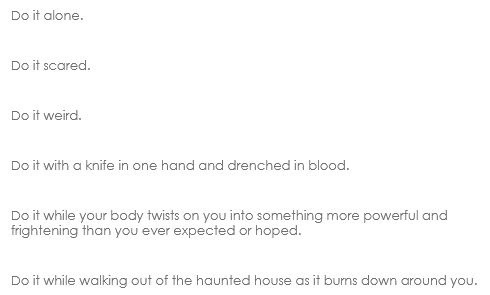
I didn't think I was writing it about myself at the time.
Earlier: I knew my odds when I came into this. Too many trans stories of heartbreak from friends as they cut people out of their lives, lost relationships and more. I knew how common it was. I wasn't expecting all of it myself, but it's where I'm at. Final Girl mode. The realization that you're very likely going to have to be walking out of the movie alone at the end right before the credits. Now: I knew the odds going in. It had been one of the facts that haunted me and kept me from coming out before. A conservatively placed 70% of marriages where one partner comes out as a trans woman after the fact end in divorce. Often very badly, with the woman in question finding herself homeless, alone, and dying on the streets without resources or any kind of network to fall back on. I came out thinking I was safe from that after my oldest kid had had a fairly smooth go of it. Turns out, I was wrong, very wrong, like a lot of people are. I ended up with three very real choices- wait and try to make it work, and see the all too stereotypical story play out. Wait until my surgeries were done with, and likely end up with massive complications and health problems because I'd still be having to push myself like mad to take care of and support more people than just me. Or get out and get out as soon as I possibly could. Obviously, I went for the last option. So, why write this? Because I know at least half of you are cis or unfamiliar with the transfem side of the experience. Because people need to know that this stuff happens, still, even in today's somewhat more accepting climate. Because I needed to exorcise all this before I felt like I could move on to newer things. And the biggest, the number one thing that I want anyone to take from this? Because I wouldn't undo any of it. If I could somehow snap my fingers, re-boy myself and make no-one the wiser, slip the denial blinders back over my own eyes and all... I wouldn't do it in the slightest. This is what I'll be moving forward from, even if I am currently hurt and just scrambling forward, I'm still moving and surviving. And I will make it out through all of this in the end.
15 notes
·
View notes
Note
How did you feel about the ending of Scarlet Witch and Quicksilver and the reveal of Magneto's letter?
I'm going to start by saying that I still think that Orlando really struggles with endings. His final issues always feel disjointed and sloppy to me, and SW&Q #4 is no exception. My main takeaway from this issue is that everything made sense in theory-- each character's positions and responses felt coherent and I perfectly understood how Orlando was characterizing each relationship-- but not in practice, as the scenario itself was harder to follow and I don't think everyone's actions made sense.
My biggest problem is understanding why Magneto would write this letter in the first place, much less keep it under his floorboards, and why, after all of the growth he went through in Red and Resurrection, he would still say those things to the twins' faces. The Griever's scheme to use the letter is clever, in terms of emotional manipulation, but Orlando does little to disguise the fact that it is a heavy-handed plot contrivance that he's using to mine Magnet Family Drama™️ in a book that otherwise has little reason to concern itself with Magneto. By comparison, the Joseph storyline in Scarlet Witch was more well integrated into the main plot and was driven by a character who was strong enough to stand on his own feet, while simultaneously facilitating conversations about Wanda and Max's relationship. This simply does not measure up to me. It feels tacked on, and the twins' abrupt, stilted reunion with Magneto himself does nothing to assuage that feeling.

Generally speaking, though, this is exactly the type of toxicity I expect from Magneto, particularly post-HoM, and post-Children's Crusade. He is overprotective to a fault towards Wanda, and resentful and dismissive towards Pietro. This has been a pretty consistent setting for their "family" dynamic for at least a decade.
I've written about this several times, but that paternalism is something Wanda has a really hard time setting boundaries around. A lot of her loved ones, including Pietro himself, have been treating her this way for a very long time. It makes perfect sense to me that she would find Magneto's words destabilizing, especially given that she is starting the series in a place of unresolved grief. I also thought it was really smart that Wanda, who, for the first time in her life has the upper hand in almost all of her relationships, is mirroring those paternalistic behaviors towards Pietro. We saw it in Scarlet Witch (2023) #1, and we saw it here in SW&Q. These flaws are crucial to balancing out Wanda's character, now that she is so powerful and evolved, and I think they've been demonstrated very well.
Similarly, I think that the twins' explosive fight in #1 was perfectly in character. To me, this felt like a more well-realized and narratively justified version of the fight from Scarlet Witch (2015) #9. A lot of the same tensions are fears are coming to a boil, but here there is a more reasonable impetus, and again, reversing Wanda and Pietro's dynamic is a great way to dig up any flaws and simmering resentments in their relationship. As fans, we want them to have a healthy, loving relationship, and I think Orlando has shown, up to this point that they do, but when we look back at their history, we can see that they do have problems. I don't think either of them is a bad sibling, but this is an area where they can be challenged and still experience satisfying growth.
And I am satisfied, because ultimately, this challenge does not break them. Although he initially allows his temper and pettiness to get the best of him, Pietro finds the patience and empathy to put their fight to rest. He falters, but ultimately, he demonstrates the same growth and self-awareness that he achieved in Quicksilver: No Surrender. I thought it was a great moment for him, and again, I love that this is a reversal in the twins' usual dynamic-- Pietro is the one doing the bulk of the emotional labor.
Wanda, for her part, hesitates more than I would like, and I really do wish that she'd been quicker to come to Pietro's defense. Most of what they're talking about here is House of M, and for all of his faults, and for as horrible as the consequences may have been, Pietro is one of the only people who consistently acted in Wanda's best interest during that time. If this scene had been given more space to breathe, or if Orlando was just a little better at grounding his dialogue, perhaps Wanda would have been able to speak and acknowledge that fact.
I think that part Scarlet Witch & Quicksilver's goal was to settle Wanda and Pietro's past with Magneto-- the same way Darkhold settled Wanda's past with Chthon and ToM settled the Decimation-- and in doing so, strengthen and refresh their relationship in a way that reflects their current maturity and growth. In a lot of ways, it succeeds, and I do think that there is some real depth and great character work here, but those things are buried under choppy pacing and dialogue. The two competing storylines-- the family drama, and the introduction of the Griever -- feel disjointed, and the expansion of Wanda and Pietro's powers gets lost in the middle. It's a shame, because setting new benchmarks for their powers and setting new benchmarks for their relationship at the same time should feel really cohesive and exciting, but for me, it falls a little flat because almost every element is just slightly underdeveloped- every idea comes just short of being fully explored.
19 notes
·
View notes